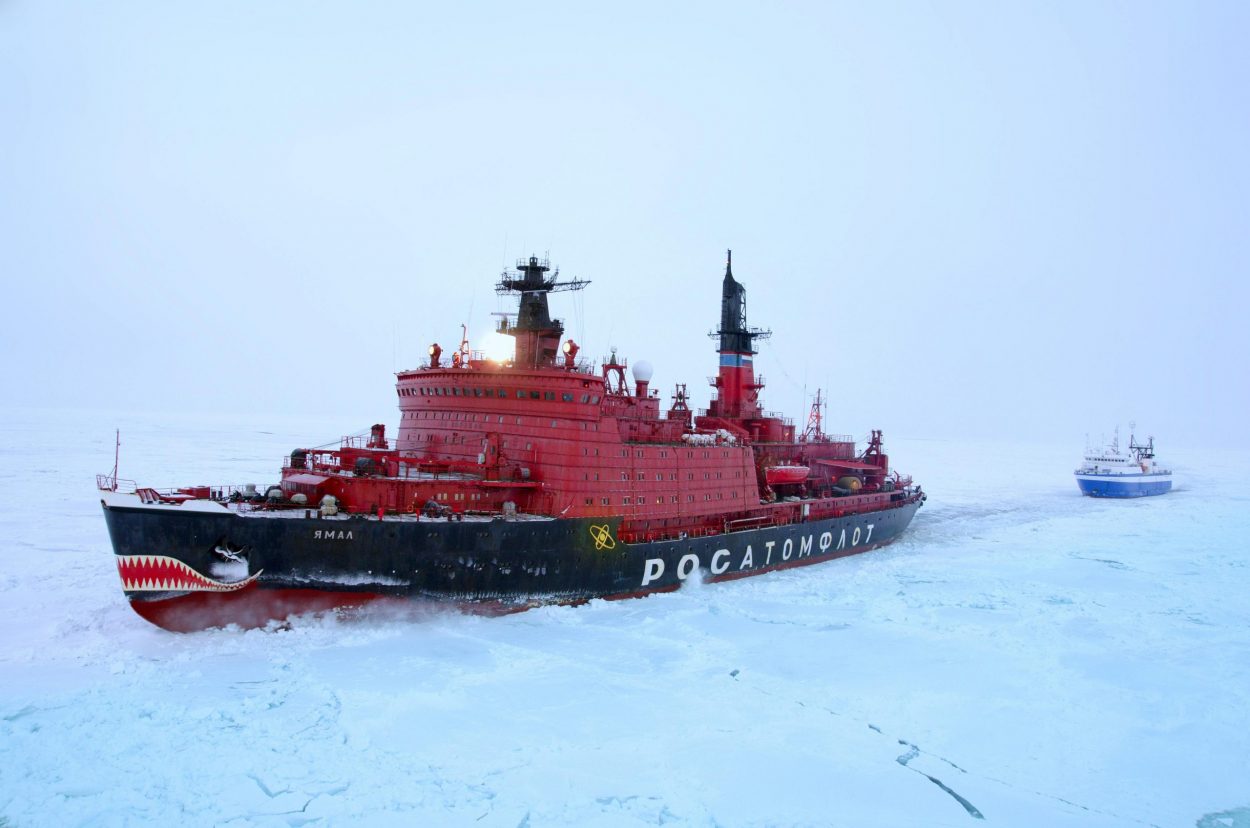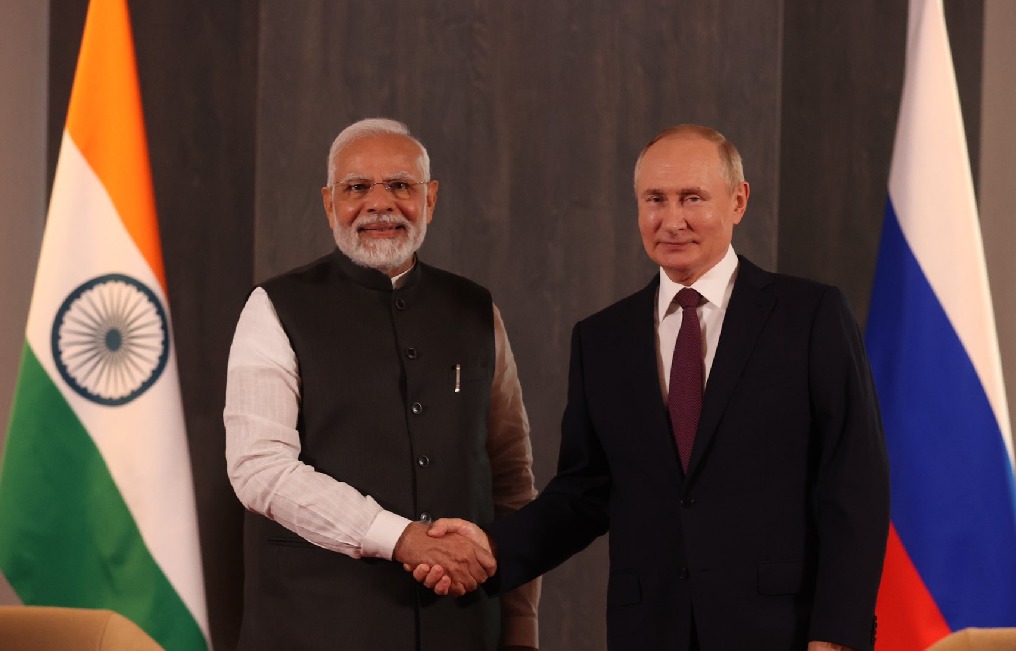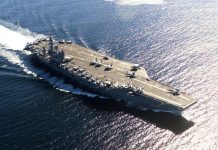Russia has chosen India over China for its non-nuclear icebreaker construction program. This decision comes as Russia seeks to develop its Northern Sea Route (NSR) and navigate the challenges posed by Western sanctions.
The collaboration not only bolsters India-Russia relations but also positions India as a key player in Arctic affairs.
In a significant move towards strengthening maritime cooperation, the Indian government is in talks with two shipbuilders—one state-owned and the other private—to construct four non-nuclear icebreaker ships valued at over Rs 6,000 crores ($750 million).
According to an ET Infra report, this initiative aims to support Russia’s state-owned nuclear energy company, ROSATOM, as it seeks “favorable and capable yards” in India for this project, particularly in light of the sanctions imposed by the United States.
Collaborative Production Plans
In November 2023, Russia revealed India’s proposal for the collaborative production of non-nuclear icebreakers.
“India has put forth a proposal for joint manufacturing of non-nuclear icebreakers in its shipyards,” stated Russian minister Alexey Chekunkov.
This announcement followed discussions Chekunkov had with an Indian business delegation attending the Eastern Economic Forum (EEF) in Vladivostok.
During these discussions, Chekunkov noted that India’s Minister of Ports and Shipping, Sarbananda Sonowal, visited Russia for the first time. He emphasized India’s eagerness to train personnel in Arctic navigation and confirmed that they are examining the proposal for joint production of icebreakers in Indian shipyards.
Furthermore, Chekunkov indicated that both countries have agreed to establish a dialogue mechanism to enhance cooperation in Russia’s Arctic region and develop the Northern Sea Route as a significant transit hub.

Russia’s Northern Sea Route Development Plan
Russia is promoting the Northern Sea Route (NSR) as an alternative global shipping route. Compared to the traditional Suez Canal route, the NSR offers faster transit between Northern Europe and East Asia.
As part of its NSR Development Plan, Russia aims to transport at least 150 million tonnes of crude oil, liquefied natural gas, coal, and other cargo annually by 2030.
The plan includes the deployment of over 50 icebreakers and ice-class vessels and the construction of new ports, terminals, and emergency response vessels to support the route.
India-Russia Cooperation In Shipbuilding
In July 2024, Indian Prime Minister Narendra Modi undertook a two-day visit to Moscow, where he met with Russian President Vladimir Putin. During this meeting, India and Russia agreed to enhance collaboration across various sectors, including nuclear power and shipbuilding.
The two sides endorsed collaboration in developing shipping between Russia and India through the Northern Sea Route and expressed their readiness to establish a joint working body within the IRIGC-TEC to facilitate this cooperation.
Russian state nuclear corporation ROSATOM announced that discussions were underway regarding new areas of cooperation, such as constructing six additional high-power units of Russian design at a new site and Russian-designed small nuclear power plants.
Additionally, ROSATOM and Indian partners explored ways to develop the transit potential of the Northern Sea Route (NSR), which extends from Murmansk, near Russia’s border with Norway, to the Bering Strait near Alaska. This development is particularly focused on facilitating the supply of Russian oil, coal, and liquefied natural gas.
Asian NATO: Why India Does Not Back Japan’s Idea Despite Tensions With China & Alliance With Tokyo?
Against this backdrop, “ROSATOM plans to construct four non-nuclear icebreaker ships in India,” according to an official familiar with the situation, said ET Infra report. The shipbuilding order is being finalized at the request of both the Indian and Russian governments.
Additionally, the official, who requested anonymity, noted that India and Russia are considering a memorandum of understanding for shipbuilding and the repair of Russian vessels at Indian shipyards, as well as for training Indian seafarers in polar waters.
These plans were discussed during the first meeting of the ‘Joint Working Group on Cooperation in the Northern Sea Route between Russia and India’ held on Thursday.
To support these initiatives, the Russian Direct Investment Fund (RDIF) and India’s Enso Group have agreed on a partnership for joint investments of up to Rs 1,800 crore (approximately $225 million) in shipbuilding infrastructure development.

Prioritizing Shared Interests
The Shipbuilding Global Market Report 2024 identifies China, South Korea, Japan, India, Germany, and the US as some of the top shipbuilding countries worldwide. Shipbuilding encompasses the construction, repair, and maintenance of vessels used for transportation, defense, and trade.
As part of India’s Maritime India Vision 2030, the Ministry of Ports, Shipping, and Waterways aims to elevate India’s global shipbuilding rank from its current position of 22nd to the top 10 by 2030 and to the top five by 2047.
Interestingly, despite various options, Russia has chosen India over China for its non-nuclear icebreaker construction program.
Exclusive: How Indian MiG-21s Thrashed F-15 Eagles During Military Drills, Shocking USAF Pilots
But Why?
Due to Western sanctions and other challenges, European shipyards are unable to construct these vessels for Russia, while shipyards in China, South Korea, and Japan are fully booked until at least 2028.
Consequently, Russia is exploring alternatives, and India stands out as a reliable partner with which it has strong relations. This is why ROSATOM is seeking Indian shipyards to build the icebreaker vessels, explained a second official familiar with the discussions regarding the potential order.
“The Northern Sea Route presents a universal platform for fostering multifaceted cooperation across various sectors. We see significant potential for collaboration with India in areas such as developing cargo flows, building shipyards, enhancing port infrastructure, and engaging Indian scientists in ROSATOM’s environmental projects in the Arctic,” a public relations manager for ROSATOM State Corporation in South Asia stated in an emailed response to ET Infra on August 20.
Opportunities & Challenges
While discussing potential orders, a government official indicated that “Russia is ready to do everything to get the icebreaker ships constructed in India, promising additional ship orders in the future.”
A Russian delegation, including ROSATOM officials, visited Indian shipyards to assess their capabilities and infrastructure. The Indian government is providing all possible support to these shipyards; however, concerns remain regarding the type of steel required for construction and the sourcing of engines for the icebreaker vessels, according to ET Infra reports.
Balancing Act: Russia’s Relations With India & China
The Russia-India collaboration on icebreaker construction marks a significant milestone in their bilateral relations and in the broader context of Arctic cooperation. This partnership not only strengthens India’s position in global shipbuilding but also establishes India as a significant player in Arctic matters.
As India and Russia deepen their Arctic cooperation, Russia is simultaneously advancing its bilateral and multilateral initiatives related to Arctic routes with China.
The Arctic Express route was launched in July 2024 as part of the ‘Ice Silk Road,’ a joint Russian-Chinese effort to establish the shortest maritime link from the Pacific Ocean to the Atlantic via the Arctic.
China sees strategic benefits in enhancing its role in the development and security of Russia’s Northern Sea Route (NSR), considering it an integral part of its Belt and Road Initiative.
The Northern Sea Route stands as a key Arctic shipping corridor, offering significant advantages such as reduced sailing times and lower costs.
India is increasingly focusing on the Arctic region, underscored by discussions on Arctic issues with Russia, which have garnered significant international attention.
Maintaining strategic cooperation with both India and China in the Arctic is crucial for Russia. This approach is part of Russia’s broader strategy to pivot towards ‘friendly’ nations in response to Western sanctions related to the Ukraine conflict.
The long-term implications of Russia’s simultaneous engagement with India and China in Arctic affairs have yet to unfold. How Russia manages these relationships and how they impact each other will be crucial in shaping the future of Arctic cooperation and global maritime dynamics.
- Shubhangi Palve is a defense and aerospace journalist. Before joining the EurAsian Times, she worked for E.T. Prime. In this capacity, she focused on covering defense strategies and the defense sector from a financial perspective. She offers over 15 years of extensive experience in the media industry, spanning print, electronic, and online domains.
- Contact the author at shubhapalve (at) gmail.com




